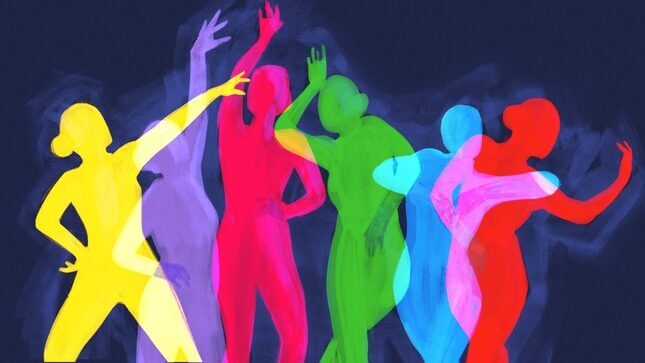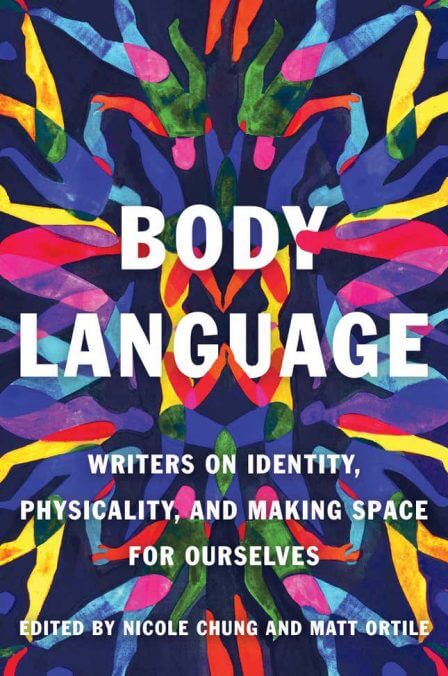I Couldn’t Escape My Body, So I Made It More Visible Instead
It took leaving the country, physically strengthening in lockdown, and reading a book called Body Language to stop blaming myself for being easy prey.
In Depth
Illustration: Allison Corr
“So, how does it feel being back?” my friend asked. We were meandering through the street after a gorgeous dinner at a trattoria nearby, basking in the evening air. I surveyed where I was. “Surreal,” I replied. “The last time I remember being on this street, I was praying to make it home alive.”
Twelve years ago, I was a 20-year-old student from a Scottish university doing an immersive exchange program in Bologna, Italy, where I had nine months to become fluent. On a night not unlike this one, I had been walking home in the middle of a dense student area that buzzed with activity—people smoking, drinking, laughing, stirring up trouble, as all young people do. Hurrying under the porticoes, I heard drunk voices calling out to me, yelling racist and sexually violent slurs to my back. I picked up my pace, waiting for one of those voices to catch up. I braced. I just needed to make it out of the area, to somewhere less lit so I could ride the shadows all the way home.
Even at the best of times, for many people I encountered in Bologna, I was unfathomable, a Russian nesting doll of identities: Asian, but American, and a UK student. Not only did I confuse my host country’s bureaucratic institutions, but my limited Italian made it impossible to explain myself as I wanted, on my own terms. I was also young—a fledgling adult learning to codeswitch across cultures and languages (and suffering from punishing loneliness when I couldn’t do so successfully), while navigating that blank-canvas life stage when my personhood was entirely impressionable to my surroundings.
Growing up Asian American in America, there was always an implicit otherness assigned to my likeness, but at least I found communion with other people of color through it. Our ideas of race and racism were crudely shaped by the reductive jokes (and, sometimes, harassment that threatened to turn into more) that we had to learn to weather. Us children of immigrants especially were easy targets, as the sharpest barbs were directed at our families and cultures for their foreignness, their “unlike-us-ness.” But it was normal—or, normalized—and we were raised together in the harshness of that shared experience. It was how we learned to understand ourselves. This was the allure of leaving home for Europe, I’d reasoned: to be fashioned into something else by new cultures, histories, and ways of thinking—to see if a different context beyond the one I was born into could accommodate more of me than just my foreignness.
This summer, I RSVP’d to two long-awaited weddings on the continent, and since the pandemic had robbed my friends and me of a 10-year college reunion, the weddings afforded an excuse to organize one in the country where we all studied abroad. We chose to meet in Bologna, my former host city. It was my first trip back to Italy in a decade, and also my first real travel since before the pandemic. After shrinking my universe to fit within the walls of my Los Angeles apartment for the last two-and-a-half years, the thought of emerging into a forcibly reopened world was more terrifying than exciting. As Jess Zimmerman writes in the closing essay of the new anthology Body Language: Writers on Identity, Physicality, and Making Space for Ourselves, “It is terrible to hang suspended over the pit and try not to look down.” Body Language, according to its editors, was assembled “to recognize and celebrate human bodies in their myriad beauties and braveries.” It is laden with stories of bodies as sites of both betrayal and stunning beauty. Even when I couldn’t recognize the writers’ experiences, I could—as Ross Showalter does in his essay on being a deaf queer writer—engage with them in conversation; they were worlds into which I ventured as a guest, and in them, I heard familiar echoes of heartbreak and transformation.
Since the formative years of my time as a student abroad, Europe had been sculpted by the outbreak of war, right-wing populism and xenophobic sentiments, and the nightmarish arrival of covid. Coming back this summer, I didn’t know if I would recognize it, whether it had changed—and if so, if it had changed for the worse. I wanted to prove that I had changed, and for the better. The anthology, I thought, would give me the language to articulate my own experience through the prism of others’. At the very least, I hoped it would help me feel less alone. So I brought it with me on this trip, to learn how to celebrate my body as it carried me back to a place where I had first gone to war with it.
When I arrived in Italy 12 years ago, I booked a hotel to serve as my home base while I searched for an apartment. On the third night, the hotel receptionist on shift knocked on the door to my room. He asked if I had ordered more towels. I hadn’t. Still, he used the opportunity to strike up a conversation and ask if I needed anything. I didn’t. He returned anyway, with Campari in hand. After an uncomfortable exchange, in which he insisted that I “try” it in front of him, I managed to get him to leave. The bathroom was located in the room next to mine, so I waited silently by my door, listening for when it was safe to venture out to use it. When I peered out to see if the coast was clear, I discovered that he had been listening for me, too. He invited me into his room, which I politely declined—and I did feel the need to be polite so as not to invite more trouble. I hid behind my locked door till daylight.
As Eloghosa Osunde writes in her devastating and beautiful essay “Don’t Let It Bury You” from Body Language, it was safer to deny my body as a thing that was “alive and desirous.” And the shame of having a body that provoked others’ wants was a lesson I would learn many times over the more I ventured out.
-

-

-

-

-

-

-

-

-

-

-

-

-

-

-

-

-

-

-

-

-

-

-

-

-

-

-

-

-

-

-

-

-

-

-

-

-

-

-

-









































